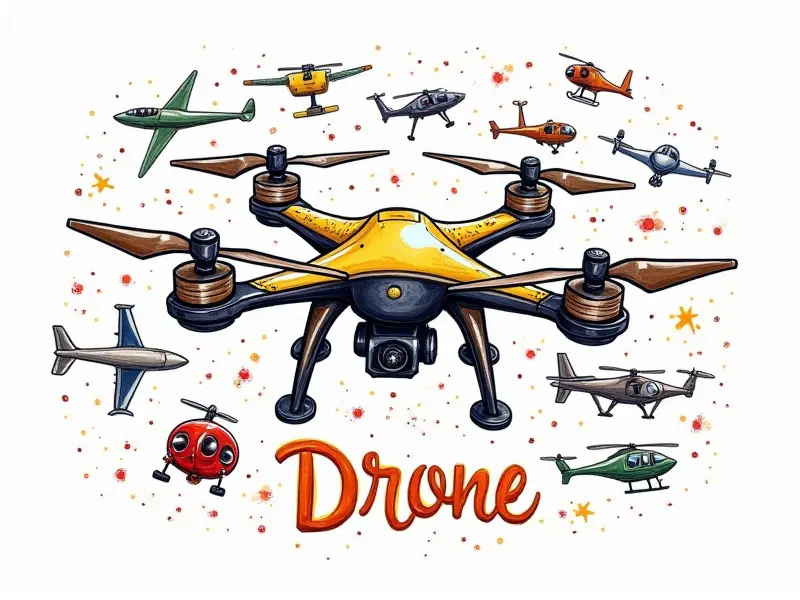How accurate is drone GPS?

Can You Trust Your Drone's GPS?
The reliability of a drone’s GPS system is crucial for its performance, especially in applications like aerial photography, surveying, and delivery services. However, the accuracy of drone GPS can vary significantly based on several factors.
Understanding Drone GPS Error Margins
Drones typically use Global Navigation Satellite Systems (GNSS) to determine their position accurately. The error margins in drone GPS are influenced by various environmental and technical conditions. Understanding these limitations is essential for users who rely heavily on precise positioning data.
Factors Affecting Drone GPS Accuracy
The accuracy of a drone's GPS can be affected by several factors:
- Satellite Visibility: The number and position of visible satellites impact the precision of the GPS signal. In urban areas or near tall buildings, fewer satellites may be available.
- Signal Interference: Electromagnetic interference from other devices can disrupt GPS signals, leading to inaccuracies in positioning.
- Atmospheric Conditions: Weather conditions such as heavy rain or snow can affect the propagation of GPS signals and introduce errors.
Improving Drone GPS Location Precision
To enhance the accuracy of drone GPS, consider implementing these strategies:
- Use RTK (Real-Time Kinematic) Technology: RTK systems provide centimeter-level precision by correcting for atmospheric errors.
- Implement PPK (Post-Processed Kinematic): Post-processing GPS data can significantly improve accuracy after the flight.
- Optimize Antenna Placement: Proper placement of the drone's GPS antenna ensures better reception and reduces signal interference.
Real-World Accuracy of Drone GPS Systems
In real-world scenarios, the accuracy of drone GPS systems can vary widely. For instance, in open fields with clear views to multiple satellites, a typical consumer-grade drone might achieve an accuracy within 5 meters. However, in urban environments or areas with dense foliage, this accuracy can drop significantly.
Why Drone GPS Isn't Always Perfect
The limitations of drone GPS systems stem from inherent challenges such as:
- Satellite Geometry: The relative positions of satellites in the sky affect the quality of the GPS signal. Poor geometry can lead to increased errors.
- Degradation Over Time: As GNSS systems age, they may experience signal degradation or become less reliable due to obsolescence.
Enhancing GPS Accuracy in Drones
To enhance the accuracy of drone GPS, consider these advanced techniques:
- Differential GPS (DGPS): DGPS uses ground-based reference stations to correct for errors and improve overall accuracy.
- Multi-GNSS Support: Utilizing multiple satellite systems like GLONASS, Galileo, or BeiDou can provide better coverage and reduce errors.
- Firmware Updates: Regularly updating the drone's firmware ensures that it benefits from the latest improvements in GPS technology.
Can You Rely on Drone GPS?
The reliability of drone GPS depends largely on the specific application and environmental conditions. For casual use, standard GPS is usually sufficient. However, for precision applications like surveying or mapping, advanced techniques such as RTK or PPK are necessary to achieve high accuracy.
Understanding Drone GPS Signal Strength
The strength of the GPS signal received by a drone can vary based on environmental factors and the quality of the receiver. Stronger signals generally lead to better accuracy and stability in positioning data.
Improving Drone GPS Tracking Precision
To improve GPS tracking precision, consider:
- Signal Amplifiers: Using signal amplifiers can boost weak signals and enhance overall performance.
- Antenna Diversity: Equipping the drone with multiple antennas can provide redundancy and better coverage.
What Influences Drone GPS Accuracy?
The accuracy of a drone's GPS is influenced by several key factors, including satellite visibility, signal interference, atmospheric conditions, and environmental obstructions. Understanding these influences helps in optimizing the performance of your drone’s GPS system.
Conclusion
In conclusion, while drone GPS systems are generally reliable for most applications, their accuracy can be significantly impacted by various factors such as satellite visibility, signal interference, and atmospheric conditions. By implementing advanced techniques like RTK or PPK, users can enhance the precision of their drones' positioning data. Understanding these limitations and taking proactive measures to improve GPS performance is crucial for achieving optimal results in drone operations.

